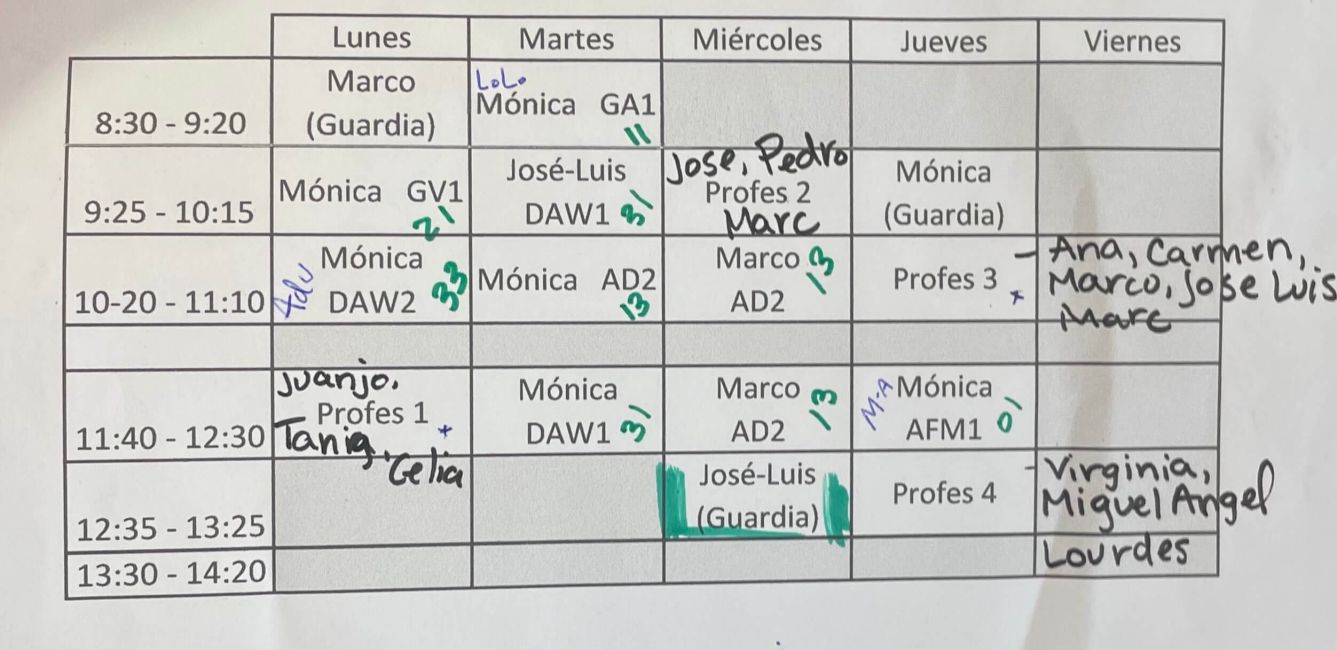Teaching Responsibilities: What to Expect
I remember the first time I ever taught a class I was 23 and felt completely inexperienced and out of my depth. It took me 3 years of teaching before I became semi-confident in my own skills as a teacher and classroom manager. Jumping into this new position as a teacher’s assistant in Spain wasn’t so scary because I’ve had those years of trial and error where I figured out my ‘persona’ as a teacher. Because, to be honest, teaching is a lot like acting most of the time! However, no teaching job in the US could really prepare me 100% for teaching in a different country, so for this Blog I’m going to lay out my top tips to not only survive at your new school, but also how to feel confident, successful and helpful in your future role as an Auxiliar.
1. Listen. Listen. Listen.
The first few days we were in Spain, CIEE organized an orientation for all participants at the hotel they had us staying in. The most useful portion of this orientation, in my humble opinion, was when they went over what our jobs as auxiliares entailed. This was where they told us that:
-We would not be lesson planning
-We would not be disciplining students
-We would not be in a class with students without another teacher present
Things we would do?
-Create occasional presentations about language and culture
-Hold Conversation Hours with students and teachers
-Try to motivate and inspire students so they want to grow their second language proficiency.
Listening during the orientation is really important because it gives you the tools you need to feel confident about your new position. Remember, when you get to the school you won’t know the teachers, your schedule, where anything is really, so it’s important to go in with as much information as you can so you can feel confident and prepared about what the expectations are.
Knowing what is expected of you also leads me to my second point. . .
2. Don’t be Afraid to Set Boundaries
In the US we have this mentality that you need to grin and bear it at work as a way to get ahead in your career. Well, that is not the situation with Teaching Abroad. When you choose to do a program like this you’re only here for a few months to a year, working 16 hours a week as a language assistant, and using the rest of your time to see and do as much as you can while you are here.
I’m really lucky with my school because they’ve worked with auxiliares before and are 100% aware that my job is as an assistant, not an instructor. I create 1 powerpoint a week that I present to all the different classes I go to. The 1 powerpoint a week is the only “outside” work I have to do and I can usually get it done during my break at school anyways. And these powerpoints are not teaching grammar structures or anything complicated. The last powerpoint I presented was just talking about Halloween and how we celebrate it in the US. We’re here to assist the teacher, but not teach core curriculum for them. So, I’m fulfilling the job description of creating a presentation every so often and facilitating Conversation Hours with students and teachers. Easy peasy and, honestly, super fun and fulfilling!
Because I get my work done at school, I have my evenings and weekends free to go explore without worrying about preparing anything for class the next day. Which is the whole point of this program! This is a really short experience that we need to take as much advantage of by traveling, trying new things, and seeing new places.
So, like I said, I’m lucky that my school gives me an appropriate workload for the stipend we receive and the level of experience most auxiliares have. However, that doesn’t mean every school will be that way. For example, my husband's school originally wanted him to plan a lesson plan for every single class he was in a week. That comes out to 16 different lesson plans because each class is one hour long. But because the CIEE orientation went over in detail what our responsibilities and expectations for this job are, he was able to have a conversation with the Director of the school and let them know he was there to work as a Language Assistant and not a teacher.
If you choose to do this program just be aware that we don’t get paid enough to be working 40 hour weeks. If the school you’re working at asks you to do more than what is in the contract, have a discussion with the Director. If you feel nervous about doing that you can call the CIEE helpline and they will walk you through what to do. CIEE is super helpful and looks out for their Auxiliares.
Basically, #knowyourworth
3. Do Some Research and Ask Questions
Once you’re at your school, you’ll get a better idea of what they want from you specifically. Maybe they won’t ever want you to do PowerPoint presentations but instead will only have you doing Conversation Hours, or maybe they’ll have you help the class through workbook activities. It’s really up to the style of the teacher you’ll be working with.
Whatever it is they have you doing, you’ll for sure be doing Conversation Hours which are really fun and fairly easy. However, every once in a while I get a group of students who are uncomfortable speaking English or who’s level is too low to discuss the topic I had planned. The first few times this happened it stumped me and I didn’t know what to do next. Because of this I looked up ESL lesson plans and conversation topics online and found a whole bunch of great online resources to give me ideas. Now, if what I originally had planned doesn’t work, I have backup activities and topics that I can use to help get students talking.
Also, these schools have worked with Auxiliares before and will have materials from previous years that you can use. I wasn’t aware of this until I expressed to the teacher that I didn’t always know what to talk about with students. She then showed me where all of the past materials were located so I can go in whenever I need to and get some inspo. I’ve heard from other Auxiliares that their schools also have older Auxiliar materials for them to use as well, so this is a great tool to use to your advantage.
Take it One Day at a Time
Each school will be different, each experience will be different, and each auxiliares talents to contribute are different. Just how you’ll be starting at a new school, keep in mind a school will be starting with a new Auxiliar.
I’m really comfortable leading whole class activities, so the teachers I work with know they can ask me to do that. Maybe you’re really good at arts and crafts and can lead fun activities like that. The point is, you’ll find your place in the school slowly but surely. There might be a bit of a language barrier at first, but everyone wants you to succeed because they want their students to learn from you. Take it day by day and figure out where your strengths as an Auxiliar lie. It might be awkward or daunting the first few days of class, but once you know what you feel comfortable with, what you're good at, and where you can help students most, you’re going to be so excited about going to work and so pumped to help your students grow.
Related Posts

TWICE with CIEE: Kayleigh in Spain (PART 2)
Kayleigh is a CIEE alum who participated in CIEE's Teach in South Korea program AND CIEE’s Teach in Spain Volunteer program! CLICK HERE to read her experience in Korea. WHY... keep reading

CIEE Volunteer Spotlight: Meet Layla!
Where are you from? What was your academic background or career before teaching abroad? I am Canadian, specifically Québécoise. In Quebec, students are required to attend community college (CEGEP) before... keep reading



